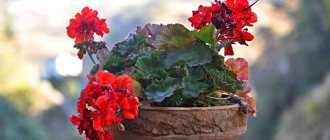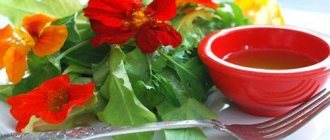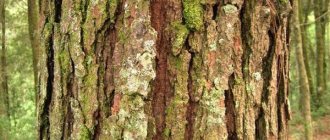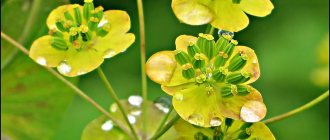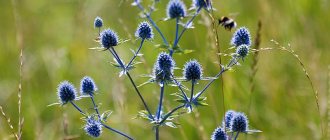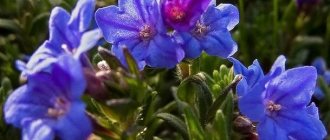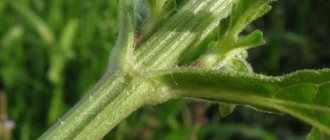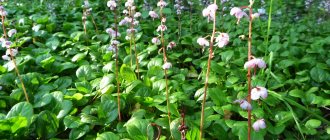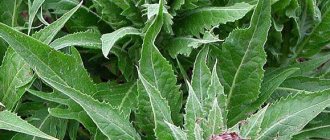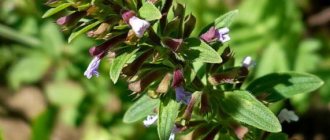Field grass or talaban (lat. Thlaspi arvense L.) is a medicinal plant that belongs to the Brassica family. The culture is annual, herbaceous. Many gardeners consider it a weed and actively fight it on their site. But this does not negate the healing properties of the plant, thanks to which it can be used for health benefits. The culture grows throughout Russia, so there are no difficulties in procuring raw materials. But, before using it for medicinal purposes, it is necessary to study the beneficial properties and contraindications of field grass.
The stems, leaves and seeds of the herb field grass, shown in the photo, are used to treat various ailments
Chemical composition of the herb
Field grass is a source of ascorbic acid, which is present in all its parts. In addition, the culture contains the glycoside sinigrin, which is why it has a specific smell and taste that is common to all representatives of this family.
The chemical composition of talaban is also rich:
- flavonoids;
- saponins;
- microelements;
- fatty acids, oils;
- isothiocyanates;
- glucosinolates;
- thioethers.
This combination of components allows the product to be used to treat many diseases. And the availability of raw materials makes it one of the most popular plants in folk medicine. In addition, the culture is used in cooking and is considered low-calorie. Therefore, it is included in some diets to maintain the vitality of the body.
Description of the plant
The pennyweed belongs to the Cruciferous family. In Russia it can be found in every garden and meadow. If you look at the photo, field grass resembles an ordinary green weed, decorated with white flowers, which are collected in small inflorescences. The plant has few leaves, so the stem looks bare.
Taproots. Leaves are placed alternately. There are no charmers. Green medicine seeds are brown with tiny grooves. They germinate for several years in a row. One plant produces from ten to fifty thousand seeds, so it spreads very quickly. Blooms from April to September.
Medicinal properties of jarutka herb
The healing properties of this herb are very diverse. And this is not surprising, judging by its chemical composition.
Important! Field grass has not been widely used in traditional medicine, so it is used only for the preparation of folk remedies.
Talaban has the following properties:
- reduces and stops bleeding;
- has an antibacterial effect;
- improves digestion;
- reduces the acidity of gastric juice;
- promotes the removal of fluid from the body;
- improves mucus removal;
- reduces inflammation;
- tones;
- strengthens the immune system.
The effectiveness of talaban has also been proven in the treatment of external wounds. To do this, it is recommended to apply applications that accelerate healing and enhance skin regeneration.
Medicinal properties of jarutka field for men
Talaban also has beneficial properties for the male body. Thanks to the content of various components, the plant increases libido. According to reviews from many men, field grass really helps improve the quality of sexual life. After all, it is one of those few plants that can treat impotence at any stage of its development.
We recommend reading: Lemongrass: during pregnancy, breastfeeding, benefits and harm
With regular use, the function of the prostate gland and all genital organs is normalized, the volume of seminal fluid increases, and the likelihood of egg fertilization increases.
The antimicrobial properties of talaban are also used to treat sexually transmitted diseases.
Talaban helps prevent the development of prostatitis
Medicinal properties of field grass for women
This plant also helps in solving gynecological problems. Talaban is effective for inflammation of the reproductive organs, irregular menstrual cycle, as well as for the development of tumors in the ovaries or uterus. Regular use of folk remedies based on field grass also helps fight infertility.
Important! Pregnant women should not use Talaban as it may cause miscarriage.
Field jar: benefits for men
Field grass can be a solution to problems with potency and improve health in general. Erectile dysfunction is often the result of many reasons. These include inflammatory diseases of the genital organs, prostate adenoma, decreased androgens in the blood, chronic fatigue and decreased overall tone of the body.
Due to the fact that yarutka has an extensive arsenal of useful substances, it can help get rid of most ailments that lead to impotence. Traditional medicine knows: this weed is endowed with anti-inflammatory and antibacterial properties, which allows it to effectively fight diseases such as prostatitis, urethritis, and cystitis. In case of prostate hyperplasia, the field plant slows down its growth, and given the antispasmodic and anti-edematous effect, it alleviates the symptoms of this disease, which is simply excellent as a folk remedy.
It is a scientifically proven fact that it increases the concentration of testosterone in the blood, i.e. the main male hormone, which is responsible for libido and sexual well-being, is involved in spermatogenesis, preventing infertility, stimulates the functioning of the gonads and the formation of muscle tissue. Plus, it improves blood circulation and strengthens the vascular wall; accordingly, if the cause of decreased erection is atherosclerosis of the vessels of the penis, this herb can improve the blood supply to the cavernous bodies, thereby fighting impotence.
In addition to its beneficial effect on the genitourinary system, yarutka is distinguished by its general strengthening, tonic and immunostimulating effects. As a result: a surge of strength and energy, improved mood in people who take decoctions and tinctures based on it.
Harm of the herb yarutka
Improper use of the plant, as well as ignoring the permissible dosage, can be harmful to health. Talaban does have healing properties, but is not a panacea for all diseases. And therefore, its use must be previously agreed with the attending physician.
Important! This medicinal herb can only be used as an addition to the main treatment, but not instead of it.
When using Talaban, you should also follow the indicated dosages. Increasing the concentration of medicinal agents can lead to the development of side effects.
Main signs of intoxication:
- redness of the facial skin;
- pain in the abdominal area;
- excessive salivation;
- nausea;
- dizziness.
If these symptoms appear, it is necessary to stop taking common grass and rinse the stomach. And also increase the amount of water you drink. If your health worsens further, you should consult a doctor.
Contraindications for treatment with field grass
Unfortunately, not everyone can try the healing properties of the plant. There are contraindications for treatment with field grass. You will have to refuse such herbal medicine if you have:
- allergic reaction to the plant;
- hypotension;
- pregnancy;
- children under 2 years of age.
If there are no contraindications for treatment, you can use this natural remedy without any fear, since it does not cause side effects.
Rules for using yarutka herb
The basic rule for using field grass for treatment is the absence of contraindications. You should also know that the herb can be taken, but at certain intervals. After a week-long course of treatment, you should take a break for three days, and only then resume therapy.
Important! You need to take folk remedies based on field grass orally before meals, and strictly following the indicated dosage in the recipes.
Do not use the herb if an allergic reaction develops.
Field jar: recipes for potency
There are many ways men can use “love herb” for impotence. All components of the plant can be used to improve reproductive health.
Most often, infusions, tinctures and powders are made from yarutka. Find out how to prepare each of the potions below!
Infusion
In order to prepare an infusion of field grass to increase potency, you should take dry shoots. Everything will come in handy: flowers, fruits and seeds. The crushed ingredients are poured with boiling water for 4 hours. It is recommended to strain the resulting infusion using gauze or a strainer. Every day, 20-30 minutes before breakfast, drink a tablespoon (course - a month). After a two-week break, treatment can be continued.
Tincture
To prepare the tincture you need: finely chop the dried herb, pour it into a glass container and add alcohol at the rate of 1 to 10. Then close it with a stopper and put it in a dark, cool place for six months. After this period, you need to strain the resulting liquid. You should take a teaspoon in the morning, before your first meal. You should not be treated with jarutka tincture for more than 120 days. A month's break is required.
Powder
The powder is prepared using a coffee grinder or grinding the dry above-ground parts of the plant in a mortar. The daily dose, 1 g of powder, is recommended to be divided into several times and consumed fractionally with a glass of water before meals. The positive effect is usually noticeable after 10-14 days of therapy. The duration of therapy is 2 months. Then you need to take a break for 2 weeks, after which treatment can be continued if the situation requires it.
The use of field grass in folk medicine
This medicinal plant is widely used in folk medicine to treat many diseases. Among which:
- infertility;
- syphilis;
- scarlet fever;
- constipation;
- diabetes;
- atherosclerosis;
- angina pectoris;
- hypertension;
- cancer;
- sexual weakness;
- rheumatism;
- headache;
- malaria;
- jaundice.
We recommend reading: Ginseng: benefits and harm, photo and description
Field grass is used for healing decoctions and infusions. It's easy to prepare them at home.
All infusions and decoctions of field grass cannot be stored for more than two days.
Recipes for folk remedies:
- For headaches. Pour 15 g of the plant into a cup. Pour 250 ml of boiling water over the mixture and boil for 3 minutes. on low heat. Leave for 2 hours, strain. Take the infusion three times a day, 20 ml.
- From infertility. Pour 30 g of field grass into 200 ml of boiling water. Infuse the product for 3 hours. After this, clear the infusion and take 20 ml six times a day.
- To normalize the menstrual cycle. Pour 400 ml of boiling water over freshly picked or dried herbs (100 g). Leave for 1 hour. Take three times a day, drinking 20 ml of the drink at a time.
- To improve potency. Grind the dried herb to a powder consistency. Take 3 mg three times a day. The resulting product can be added to dishes or consumed separately with water.
- For diabetes mellitus. Plant seeds (1 tsp) pour 200 ml of water. Boil over low heat for 5 minutes. Leave for 2 hours. Take three times a day, drinking 20 ml of the product.
- For syphilis. Pour 1 tbsp. l. collection into a container, fill it with 250 ml of boiling water. Leave for 3 hours, closing the lid and adding additional insulation. Take the remedy twice a day, 30 ml.
Benefits of use
- Field grass has found its application in folk medicine and is used for impotence and weakened sexual function in men. In addition, it is recommended to eat it to prevent these ailments.
- Traditional healers also use this herb to regulate the menstrual cycle in women.
- Chinese medicine uses the herb to treat eye inflammation, diabetes, atherosclerosis, hypertension and myocarditis.
- Preparations based on it, in combination with potent drugs, help in the treatment of ovarian dysfunction, uterine cancer, scarlet fever and jaundice.
- Fresh juice from the plant will help get rid of warts and treat minor wounds or abrasions on the skin.
- Aqueous solutions from this plant act as an expectorant, diaphoretic, diuretic and disinfectant.
- The seeds are taken internally to increase body tone and endurance.
- Our ancestors treated syphilis and gonorrhea with decoctions and infusions of jarutka.
Collection and storage rules
Medicinal raw materials can be collected throughout the entire growing season of the plant. But the greatest concentration of nutrients in the leaves and stems is found during flowering. Therefore, it is best to do this in May.
Since the seeds of the plant are also used for medicinal purposes, they should be collected in early September. You need to dry the raw materials in a dark, well-ventilated place, excluding exposure to sunlight. It is recommended to store in glass, tightly closed jars. Shelf life – one year.
Medicinal and beneficial properties of yarutka
Field talaban contains the following biologically active substances:
- B vitamin;
- acetylsalicylic acid;
- sinigrin;
- saponins;
- flavonoids;
- glycosides;
- fixed oils;
- a number of other acids and minerals.
Jarutka is valued for the following properties:
- antihistamine;
- antifever;
- disinfectant;
- diaphoretic;
- diuretic;
- removing phlegm;
- is a good diuretic;
- potency stimulant;
- hemostatic properties;
- for accelerating the menstrual process.
A decoction of yarutka has wound-healing and antimicrobial properties, therefore, as a lotion, it is applied to wounds that begin to fester, to extensive ulcers for their fastest healing.
This medicinal annual is used in the treatment of scarlet fever and angina, jaundice and gonorrhea. During heavy periods, the infusion of yarutka is taken orally to stop bleeding.
Yarutka helps to increase the potency of the male population

